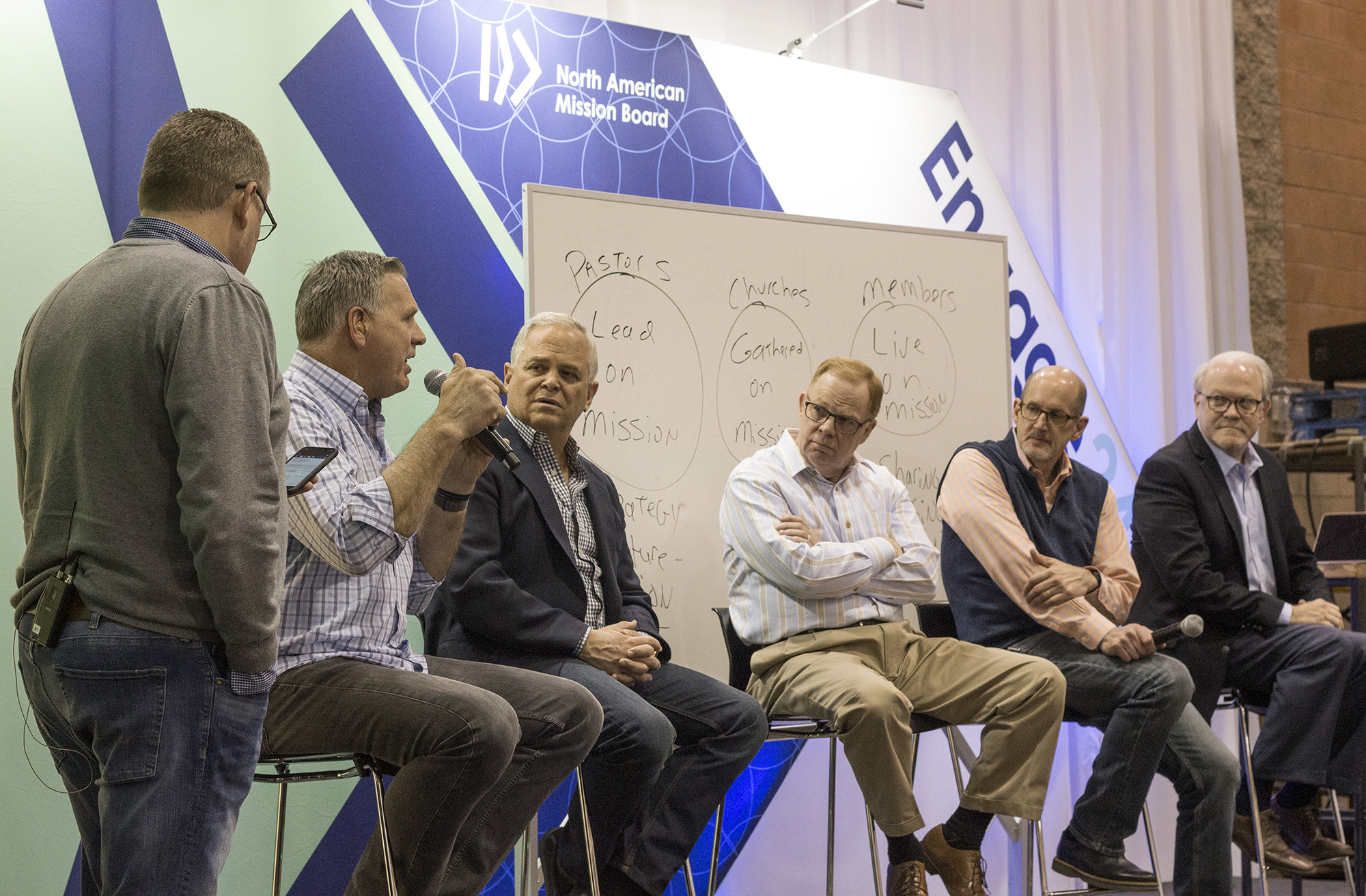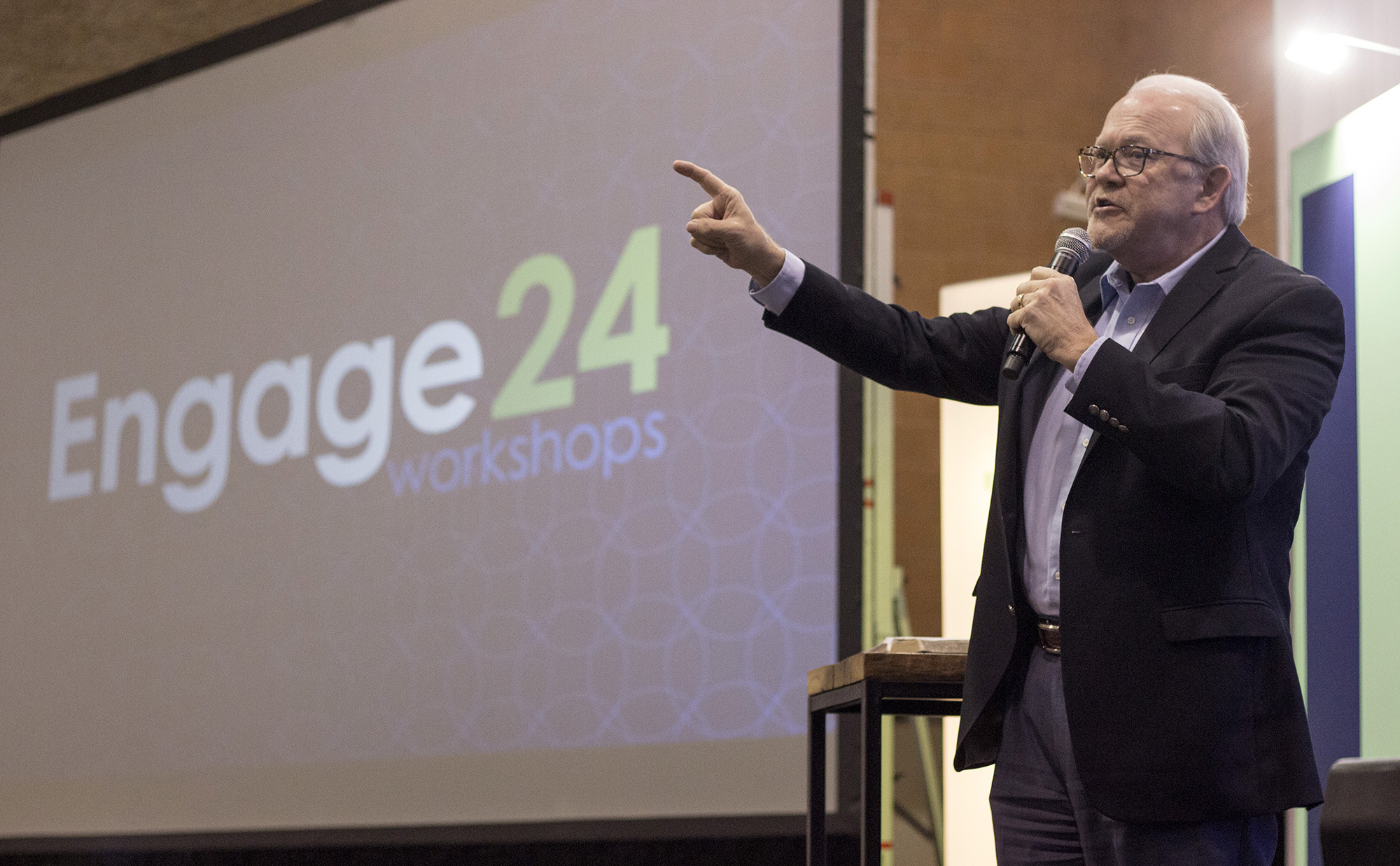
EDITOR’S NOTE: See additional story below on Frank S. Page’s message during the Engage 24 Workshop in Las Vegas.
LAS VEGAS (BP) — “We are five men who are sharing our laboratory results,” said Hal Seed, senior pastor at New Song Community Church in Oceanside, Calif., at this year’s Engage 24 Workshop. “We are sharing stories of real-life churches that are doing things to reach the lost that will hopefully spark a thought or idea.”
 Engage 24 was hosted at Shadow Hills Church in Las Vegas by the North American Mission Board (NAMB) for two days before continuing its workshops in different states. The event focused on encouraging pastors and church leaders and covered practical ways they could create and foster a culture of evangelism in their own churches.
Engage 24 was hosted at Shadow Hills Church in Las Vegas by the North American Mission Board (NAMB) for two days before continuing its workshops in different states. The event focused on encouraging pastors and church leaders and covered practical ways they could create and foster a culture of evangelism in their own churches.
The workshop welcomed more than 210 people Feb. 26-27, the most the event has seen in its three years. The event drew leaders from small, medium and large churches in California, Nevada, Arizona, Utah and Tennessee.
Sitting around circular tables to nurture conversation, attendees heard individually from Ted Traylor, John Meador, Tim Dowdy, Seed and Frank S. Page before the final event of the first day — a question-and-answer panel featuring all the event’s speakers.
The church leaders were encouraged to send their questions via text throughout the day. Submitted questions were then chosen by Joel Southerland, NAMB executive director of evangelism.
The discussion covered topics such as making time for family, keeping a balance within pastors’ lives, how small churches can go about engaging their communities, attracting volunteers, and handling sabbaticals.
The men shared their own distinct experiences when answering questions to give the attendees a variety of perspectives to take back and decide what would work best for their own churches.
 Seed shared how traditional marketing techniques, such as taking out an advertisement in a news publication, assisted in starting from scratch when he planted a church in southern California. Traylor, lead pastor at Olive Baptist Church in Pensacola, Fla., noted he relied mostly on personal invitations to gain more members.
Seed shared how traditional marketing techniques, such as taking out an advertisement in a news publication, assisted in starting from scratch when he planted a church in southern California. Traylor, lead pastor at Olive Baptist Church in Pensacola, Fla., noted he relied mostly on personal invitations to gain more members.
Navigating a range of subjects, the panelists provided their listeners with “evergreen principles” for evangelism, which Southerland defined as tactics that were true regardless of time, technology, place or culture.
“(The workshop) provides more of a practical ‘how to’ rather than ‘ought to,'” said Page, Southern Baptist Convention Executive Committee president. “The intent of this Engage 24 is not to provide only a ‘why’ but a ‘how’ to get it done — sharing best practices, transferable concepts so that other churches can become more evangelistic in their outreach. It’s more than just preaching, it’s teaching so that people can learn skills.”
Seed said, “I hear so many pastors say, ‘You’ve got to love the lost, you’ve got to win the lost.’ People in the pew think, ‘I should but I don’t know how. I want (the attendees) to go home with practical ways their pastor can share for their people to be empowered to reach their community.”
One topic discussed on the panel was the realistic ways leaders could gain more volunteers as well as use them to their full potential.
Meador, lead pastor at First Euless Baptist Church in Euless, Texas, highlighted the importance of appreciating one’s volunteers while Traylor mentioned how after he served alongside preschool teachers one Sunday morning, he noticed an increase of preschool teachers in the following weeks. Page focused on setting expectations for a church and watching the members rise to those expectations.
Dowdy, lead pastor for Eagle’s Landing First Baptist Church in McDonough, Ga., emphasized the importance for pastors to begin the conversation and set the precedence for evangelism in their churches.
“The pastor has to lead out in evangelism in the life of the church,” Dowdy said. “You can’t forget what it’s like to be lost and not know Jesus and you have to see evangelism as opportunity, not obligation. It’s more about us, as pastors and leaders, and how we set the tone for the culture for evangelism in our own church.”
Aside from practical advice, the panelists also offered encouragement and support since most remembered being new and downtrodden pastors at one time.
“It can get discouraging when you’re working so hard and you don’t see the fruit,” Dowdy said. “If this event encourages one pastor or staff member to say, ‘I’m not going to quit. I’m going to stay faithful and live a life pleasing to the Lord, holding out Jesus to the world’ then everything will be well worth it.”
Although many topics were discussed, the necessity of evangelism set the tone for the event, reminding the attendees that evangelistic efforts needed to prioritize those outside the church, as well as inside.
“Evangelism is the life blood of the church,” Traylor said. “We must change from an inward focus to an outward focus. If we don’t, then we’re coming to death in the church. Evangelism is essential to the future of the church of having new people want to know Christ and welcome them into the family.”
The next Engage 24 workshop will be March 22-23 in Philadelphia.
See additional story below.
–30–
Page to church leaders: Foster change
in evangelistic church culture
By Kaitlynn Labit
LAS VEGAS (BP) — To a room full of pastors and church leaders looking toward creating a stronger evangelistic church and congregation, Frank S. Page encouraged them to intentionally cross borders, risk negativity and create a loving environment without compromising truth.
The Southern Baptist Convention Executive Committee president was one of several featured speakers at the Engage 24 Workshop on Monday (Feb. 26) at Shadow Hills Church in Las Vegas.
Referencing Jesus’ interaction with the Samaritan Woman in John 4, Page spoke about the responsibility and call of the church to be leaders in building and maintaining relationships with those who are currently a part of a congregation, as well as those who are not. He noted this requires proactive engagement and responding to the responsibility of the church.
“The church is called to be the hands and feet of Christ,” he said. “Christ was the great example of reaching across ethnic and gender boundaries, and so if we’re going to follow Christ, we have to be His hands and feet in doing that in the world. And what other organization is it? Is it education? Is it government? Who is it that should be leading the way? It ought to be the church, not following, not pulling up the rear, but leading in this.
“The church is duty-bound because of our allegiance to Christ to be like Him in this world,” he said, “and that’s reaching across these barriers like Jesus did with the woman at the well.”
Instead of presenting topics such as racial, ethnic and gender tensions as new 21st century problems existing in the church, Page presented them as old matters, reminding attendees of the cross-culture barriers and social strain during the time of Paul the apostle.
While offering practical advice of creating relationships with those of different socioeconomic, ethnic, racial or gender differences, Page questioned churches and what he calls “holy huddles” on how they plan to reach the lost. They can’t continue to spend all their time with those who are like them, he said. They must proactively seek those from different backgrounds and cultures. He challenged the conference participants to change their church’s culture to be about equal discipleship within and outside of their community.
“It’s all about balance. If you begin to neglect those you have, that will hurt,” Page noted. “It’s all about biblical discipleship but also balance — training people that (they’re) limited in time and so (they) have to focus on several things. Scripture doesn’t just tell us to do one thing, but several things. So it’s all about balance and discipleship.”
As pastors tend to their current congregations while working to include those different from them, whether it be age, generation, gender, race or ethnicity, Page highlighted the importance of creating a loving environment without compromising truth.
Using John 4:16-17, Page shared how to create an atmosphere of care without undermining truth. He highlighted the verses in which Jesus addressed the wrong the woman at the well had committed while balancing truth and love as an example of truthfully loving someone.
“We try to be nice in church and that’s good and we want to be Christ-like and affirming,” he said. “There is a fine line, back to balance, between letting someone know you love them unconditionally but at the same time saying, ‘You know, if I’m going to be a true friend to you, you have to realize what you’re doing is not right.’
“You have to be honest,” he said, “and if you really love someone, you’re going to tell them the truth but you have to have a relationship where you can do that.”













